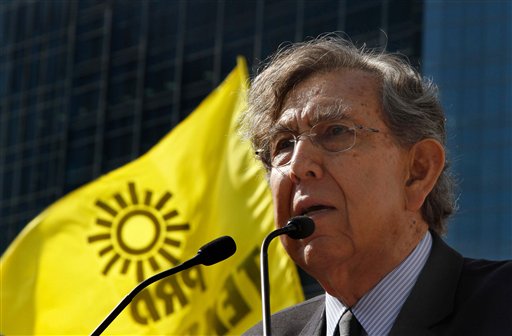
In this Dec. 10, 2013 file photo, Cuauhtemoc Cardenas, the son of the late President Lazaro Cardenas who nationalized Mexico’s oil industry in 1938, speaks during a march against the energy reform bill at the Angel of Independence monument in Mexico City. A pillar of leftist politics in Mexico and son of a revered former president, Cardenas, has resigned Nov. 25, 2014, from the party he founded in a dispute with its leadership. (AP Photo/Marco Ugarte, File)
MEXICO CITY — Mexico’s left faces huge problems following the resignation of former presidential candidate Cuauhtemoc Cardenas, a pillar of progressive politics and son of the revered president who nationalized the oil industry.
In 1989, Cardenas founded the Democratic Revolution Party, known as the PRD. On Wednesday he said he is not only leaving the PRD, but party politics entirely.
“I think that, with this, my life in a party is over … I’m not going to any other political party,” Cardenas told the Radio Formula station, adding that he would continue to work on his favorite cause, reversing recent government reforms that opened the state-run oil sector to private investment and concessions.
Cardenas was central to the very foundation of the party, which was born out of a political coalition that formed to support his 1988 presidential campaign in an attempt to topple the party that had then ruled Mexico for nearly 60 years. Millions of Mexicans believe he won that election, but was cheated by fraud.
Cardenas also was by far the most widely respected figure to remain in the PRD after another former presidential candidate, Andres Manuel Lopez Obrador, quit to form a new leftist party.
“On one hand, (the loss of Cardenas) is a blow to the party; on the other hand, it frees it” to become a more modern left, said Tony Payan, director of the Mexico Center at Rice University’s Baker Institute for Public Policy.
Cardenas is inextricably linked to his father Lazaro Cardenas and the old style of nationalist politics and state-run enterprises, something that had inspired previous generations but now seemed somewhat dated.
“This makes him in reality a conservative figure, a figure who defends the ‘status quo’ from before,” Payan said. “That was no longer sustainable, anywhere in the world.”
The PRD had earned the wrath of Cardenas and others by appearing too willing to collaborate with President Enrique Pena Nieto on some of his reforms, though not the oil-sector opening.
But the PRD’s worst failure came when it allowed Jose Luis Abarca to run for mayor of the southern city of Iguala, in Guerrero state, on the PRD ticket.
Abarca was, in fact, aligned with a local drug gang and allegedly ordered the kidnapping of 43 students from a local teachers college. The drug gang then allegedly killed the students and incinerated their remains.
PRD party leader Carlos Navarrete has apologized for that decision, but it has kept the party on the sidelines of the biggest cause for Mexico’s left in years. Protests demanding the government find the students have seen tens of thousands hit the streets in demonstrations whose fervor hasn’t been seen in years.
It all made the PRD look like it lost its moral and ideological compass, one firmly oriented to supporting farmers and the urban poor.
“They have to find that compass again, and I think that is where they’re lost,” said Payan.